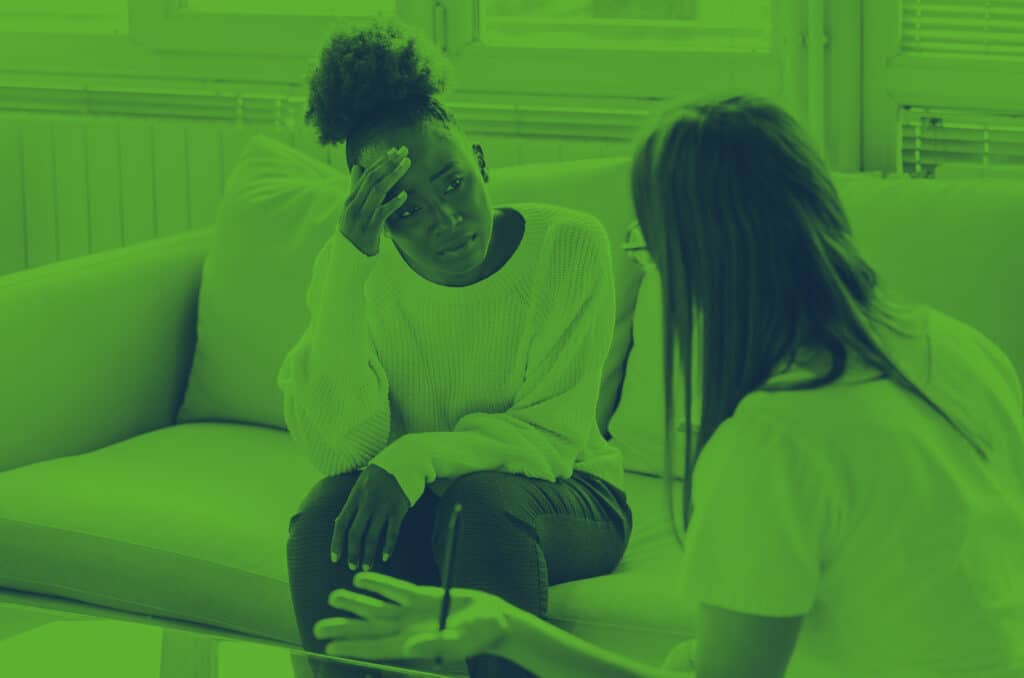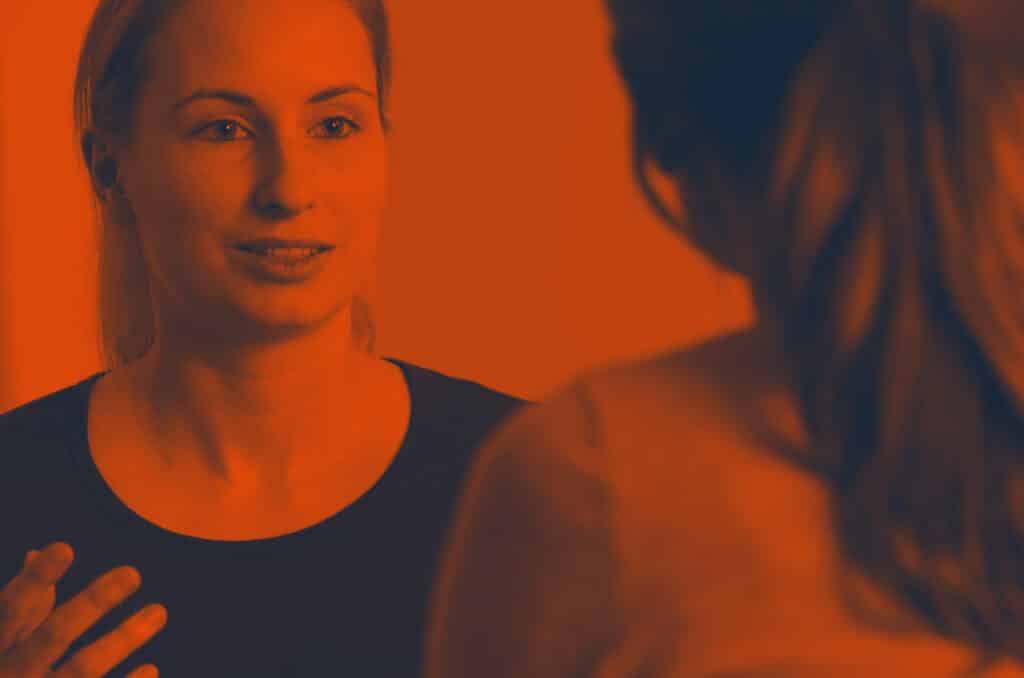Counselling is a form of talking therapy that profoundly impacts the lives of individuals as well as families and that feeling you get when you see someone morph into a confident, happier and stronger version of themselves, and knowing that you played a part in that, is like no other. So, if you're wondering how to become a counsellor, you're in the right place.
A career as a counsellor is hugely rewarding. Knowing that the aim of your role is to help people can give you a great sense of purpose. If you are interested in assisting children and adults grow in confidence, helping people strengthen their mental health and relationships or are eager to work with families to aid conflict resolution, a career as a counsellor might be for you.
Perhaps the most exciting part of counselling is that no two appointments will ever be the same. Even if you have two clients dealing with the same issue, their individual histories will mean your approach to helping them will be drastically different.
Does this sound like a career that's up your street? See all our counselling courses, or keep on reading as we tell you all there is to know about this exciting pathway. Our guide covers everything from the qualifications, accreditations, and professional bodies you'll need to be associated with, potential salary, what makes a great counsellor, and more so you can confidently take your first step towards a new career.
- What is counselling?
- Is counselling a good career?
- What is a counsellor?
- Are counsellors in demand?
- What does a counsellor do?
- How to become a counsellor
- What qualifications do you need to become a counsellor?
- Do I need a degree to be a counsellor?
- How do I become a counsellor without going to university?
- Counselling accreditation and licensing
- Life as a counsellor
- What makes a great counsellor?
- What are the benefits of becoming a counsellor?
- How much do counsellors earn?
- Am I ready to begin counselling training?
What is counselling?
Counselling is a form of talking therapy that profoundly impacts the lives of individuals, families and communities, as it helps people cope with many different problems faced in life. It is often a one-on-one form of treatment where a trained therapist helps individuals cope with:
- Difficult physical health diagnoses
- Mental health conditions
- Exploring sexual identity
- Navigating difficult life events
- Working through complicated emotions
Plus, there are many more complex experiences and issues.

Is counselling a good career?
Counselling is a fantastic career choice for those with the right skills, empathy, and drive to help others. After you've qualified, you can practise in various places, such as a hospital, a school, college, or university, or at a private practice. Once established, you can set up your own business and work for yourself.
Another big draw to a counselling career is flexibility. Particularly for those self-employed, you can arrange appointments to suit your schedule, giving you freedom that isn't easy to come by.
What is a counsellor?
A counsellor is a trained and qualified therapist who improves clients' mental and emotional health and well-being. Through different therapy techniques, counsellors help people talk about their feelings and think about their goals; they coach people to develop tools to make positive changes in their lives.
A successful counsellor builds trust with their clients, supporting them in being open and honest about their feelings and experiences. Then, they often encourage their clients to challenge their own thoughts and be open to change.
But most importantly, counsellors respect every individual they work with, regardless of background, valuing diversity and promoting inclusiveness and acceptance. It’s a counsellor’s responsibility to make sure every client feels safe whilst maintaining a duty to report crime or threat of harm.
Are counsellors in demand?
Sadly, many people out there don't feel comfortable talking about what they are going through with their friends or family, or their support network doesn't feel comfortable providing that level of support. And some don't have anybody to talk to at all.
Data from ONS in May 2021 revealed that depression rates doubled since the pandemic, stating that the UK mental health crisis is growing while access to help is on a downward trajectory. Needless to say, counsellors are very much in demand at the moment and, likely, always will be.
What does a counsellor do?
A counsellor will have a certain number of scheduled therapy sessions every day, with time in between to write notes, follow up with calls or emails, and work on plans for future sessions. Depending on their client's needs and their specialist areas of expertise, they may work with couples, families, or groups as well as single individuals, in either a face-to-face setting, online or via a phone conversation.
There are many different types of talking therapies, from those based on self-development to behavioural therapies used to change specific patterns for a better outcome and quality of life. Counsellors can specialise in particular types of treatment, with the most common being:
- Art therapy
- Cognitive behavioural therapy (CBT)
- Family/relationship therapy
- Neuro-linguistic programming (NLP)
- Psychoanalysis.
Whatever type of therapy you're interested in, your daily routine will be spent listening to and empathising with your clients. You'll also challenge them with questions and tasks to help them make progress towards overcoming their difficulties.
How to become a counsellor
Becoming a counsellor takes a lot of hard work, training and dedication. In this section, we run through the qualifications and accreditations you’ll need to become a fully-licensed counsellor in the UK, with or without going to University.
What qualifications do you need to become a counsellor?
There are a few different pathways into a counselling career, which means you can pursue your dream whether you’re about to go to college or are searching for a career change.

Your minimum core training must be a Level 3 diploma in counselling or psychotherapy.
You could also study for a bachelor's degree, master's or doctorate if you've reached those levels.
We always recommend that our students begin with an introductory course to ensure it's the right career for you before you invest more time and money into training.
When choosing your course, make sure that it's regulated and accredited to ensure the standards of quality reflect the industry's best practices.
Do I need a degree to be a counsellor?
A degree in counselling is impressive but not necessary to start your career. There are loads of non-university courses available that are licensed and accredited that will vouch for your knowledge and ability.
Memberships with these organisations mean you'll always be encouraged to take on further training (which we will talk about in a bit more detail later on) to keep you up to date with the best practices and methods to help your clients.
How do I become a counsellor without going to university?
To become a qualified counsellor without committing the time and funds to a university degree, you’ll have to complete an accredited and licensed course and undergo some hands-on work experience.
There are loads of courses available out there, so you need to make sure your preferred option covers a few key areas. Firstly, check whether you can gain membership with a counselling association once qualified. Then, read through the course specification to ensure it covers the psychological theories, laws, and ethics that underpin counselling practises, as well as the health conditions and medications that your clients may have.
Next, make sure your course evaluates your therapeutic competence somehow, monitoring your relationship-building skills, reflective strategies, and application of therapy.
Once you’ve achieved your qualification, you can start gaining more practical experience in counselling.
Counselling accreditation and licensing
To practise, you'll need to register with a counselling association and attain a license. There are many counselling associations, so make sure you choose a recognised professional body, like the ACCPH (Accredited Counsellors, Coaches, Psychotherapists or Hypnotherapists).
Our Level 2 and Level 3 counselling courses have professional endorsement by the ACCPH, so you’ll be able to gain membership with them.
There are other associations, like BACP and the NCS, but you need to check that they accept your qualification.
Holding membership with a counselling association can give you access to further resources, knowledge and networks within the industry, benefiting your development and future career paths. It will also improve your employability as you'll have professional credibility. In addition, counselling organisations exist to raise the ethical standards of the profession.
Life as a counsellor
While life as a counsellor brings something new to the table every day, it’s also a cyclical process, so those who enjoy working on projects and seeing them through to completion will feel gratified regularly.
It's essential to strike the right balance between showing empathy and getting too involved. Perhaps the most important trait you'll need is the ability to say no to taking on a client. There will naturally be circumstances where a client's problems hit a little too close to home; therefore, it's essential always to put your wellbeing first and foremost. Struggling through sessions won't help anybody, least of all your client.
Most importantly, the clients who complete your sessions will likely leave as very different people compared to when they walked in. Seeing that transformation is pretty spectacular, and you’ll enjoy it time and time again.
What makes a great counsellor?
If you hold these six traits, you’ll likely make an excellent counsellor:
- Effective communication
One essential trait required to be a successful counsellor is the ability to communicate effectively. This includes being able to implement excellent listening skills to understand the needs of clients properly.
Additionally, developing proper questioning techniques is required to build a productive, trusting, open and honest client-counsellor relationship.
- Trust-building skills
Helping clients feel at ease and establishing a good rapport during the initial stages of counselling is crucial. People who wish to access counselling will usually do so due to having issues or concerns they need to work through. As this may be difficult for them, it is essential that they feel they can trust their counsellor. When they feel safe, they will be more likely to express themselves freely.
- Expressing empathy
To be effective, a counsellor must have an overall empathetic desire to help others improve their situation. Empathy refers to the ability to understand and relate to other people’s feelings.
- Great patience
Counsellors work with people with a diverse range of needs. Therefore, patience is crucial. Some clients will be more challenging than others, either due to non-engagement or being purposefully obstructive.
Behaviours like these need to be responded to positively and in a tolerant manner. Efficient management of these behaviours can prevent barriers from being built and help to maintain positive relationships.
- Lack of judgement
With a wide range of past experiences, people from all walks of life may benefit from counselling. Even if a client has made decisions or acted in a way their counsellor cannot relate to or agree with, it is the counsellor's responsibility to treat them the same as they would treat anyone else and remain non-judgemental.
- Sensitivity
A counsellor's job role requires them to explore potentially problematic aspects of a client's past. Therefore, sensitivity is essential. This includes being mindful of the questioning techniques they choose to utilise. In this role, there is no such thing as a one-size-fits-all approach.
What are the benefits of becoming a counsellor?
There’s no better feeling than the kind you get from helping someone for no other reason than to see them happy. Human beings are naturally inclined to be empathetic, supportive, and community-focused, it’s instinctive to help another in need. And whilst this is a selfless act, there’s no denying that caring for others has its benefits.
Many counsellors find their job hugely rewarding, as they know they’ve helped people by giving them a safe space to explore their feelings and develop the mental tools needed to overcome challenges. It’s about offering value to other people’s lives, with the privilege of being trusted with others’ struggles as you help them to grow in confidence and happiness.
By becoming a counsellor, you’ll be planting the seeds for healthy coping mechanisms and skills that will impact many generations to come! You’ll get to learn something different every day, making new connections and experiencing new levels of insight with every client you work with. What's more, there’s great opportunity for career development within the counselling industry, allowing you to hone your skills in a variety of specialist areas and progress to higher levels of care.

This is a commitment that concerns your duty of care to your clients, and that’s a good thing! It means there is ample opportunity for career progression, especially if you choose to specialise in a specific area of counselling. Specialising in areas such as addiction, CBT, or counselling for children will require additional training. Still, it adds value to your services, enabling you to address the specific needs of your clients.
Of course, earning varies depending on the level you are working at and where you are employed. On average, a full-time counsellor working for the NHS earns between £20k £26k annually. However, a part-time counsellor might earn the same working in a private clinic or running their own counselling business, as they can set their own hourly rates. Experienced counsellors in specialist roles can earn between £30k £40k a year.
How much do counsellors earn?
You're under an ethical obligation to pursue continued professional development while working as a counsellor. Counsellors need to uphold the highest standard of practice, and to do so, they need to be regularly learning, researching, and evolving with new methods and approaches to therapy.
This means that there is ample opportunity for career progression, especially if you choose to specialise in a specific area of counselling. Specialising in areas such as addiction, CBT, or counselling for children will require additional training, but it adds value to your services, enabling you to address the specific needs of your clients.
And, of course, earning varies depending on the level you are working at and where you are employed. On average, a full-time counsellor working for the NHS makes between £20k – £26k annually. However, a part-time counsellor might earn the same working in a private clinic or running their own counselling business, as they can set their own hourly rates. Experienced counsellors in specialist roles can earn between £30k – £40k a year.
How much does a counsellor earn?
£40,000
experienced
£23,000
established
£20,000
beginner/apprentice
Am I ready to begin counselling training?
If you'd like to take the first step towards a career as a counsellor, Oxbridge can help you secure the qualifications you need. For more information, take a look through our counselling courses, call us on 0121 630 3000 or open a live chat with our experienced course and learning advisors.